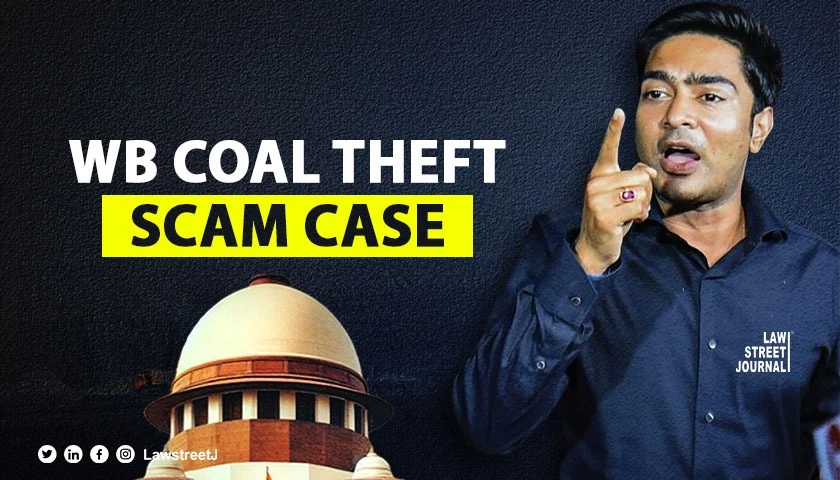NEW DELHI: The Supreme Court on Monday rejected pleas filed by TMC MP Abhishek Banerjee and his wife Rujira Banerjee against the summons by Enforcement Directorate to appear before the New Delhi office in connection with a money laundering probe linked to a coal theft and illegal extraction scam in West Bengal.
A bench of Justices Bela Trivedi and Satish Chandra Sharma held that the Prevention of Money Laundering Act was a complete code and the provisions of the Criminal Procedure Code would not apply to raise the issue of jurisdiction.
Banerjee and his wife Rujira Banerjee had moved the apex court challenging a Delhi High Court order of March 11, 2022, which declined to quash summons issued by the ED.
In its judgment, the court held there was no any illegality in the summons issued by the ED seeking presence of the appellants to its office at Delhi, which also has the territorial jurisdiction, a part of the offence having been allegedly committed by the accused persons as alleged in the complaint.
The court also said it is also not disputed that Banerjee, being a Member of Parliament has also an official residence at Delhi.
It also noted the offices of the Enforcement Directorate all over the country are set up to ensure that the money laundering offences are investigated in an effective manner and they act as deterrence for the potential offenders. Pertinently, the Headquarters Investigation Unit (HIU) has not been restricted to any territorial jurisdiction in the said organisational structure.
The court noted the present case was recorded at the HIU in 2020.
As per the specific case of the ED in the complaint, filed against the accused persons before the Special Court, PMLA, Rouse Avenue Courts, New Delhi, Rs 168 Crores were allegedly received by the Inspector Ashok Kumar Mishra from the co-accused Anup Majee to be delivered to his political bosses, and the said Rs 168 Crores were transferred through vouchers to Delhi and Overseas, which clearly established adequate nexus of the offence and the offenders with the territory of Delhi, the court said.
The bench also pointed out the conferment of power upon the authority under Section 50 of PMLA excluding the procedural safeguards would be contrary to the standard of “procedure established by law” under Article 21 of the Constitution, is also thoroughly misconceived.
Relying upon Vijay Madanlal case judgement, the bench said at the stage of issue of summons, the person cannot claim protection under Article 20(3) of the Constitution, the same being not “testimonial compulsion”.
At the stage of recording of statement of a person for the purpose of inquiring into the relevant facts in connection with the property being proceeds of crime, is not an investigation for prosecution as such. The summons can be issued even to witnesses in the inquiry so conducted by the authorized officers, it said.
The consequences of Article 20(3) of the Constitution or Section 25 of the Evidence Act may come into play only if the involvement of such person (noticee) is revealed and his or her statements is recorded after a formal arrest by the ED official, it added.
The bench said under the provisions of the PMLA, it is abundantly clear that the dispensation regarding Prevention of Money Laundering, Attachment of Proceeds of Crime, and Inquiry/Investigation of offence of Money Laundering including issuing summons, recording of statements, calling upon persons for production of documents etc upto filing of the Complaint in respect of offence under Section 3 of PMLA is fully governed by the provisions of the said Act itself.
The jurisdictional police who is governed by the regime of Chapter XII of the Code, can not register the offence of money laundering, nor can investigate into it, in view of the special procedure prescribed under the PMLA with regard to the registration of offence and inquiry/investigation thereof, and that the special procedure
must prevail in terms of Section 71 of the PMLA, the bench said.
"Apart from the fact that Section 50 is a gender neutral, as it does not make any distinction between a man and a woman, there are glaring inconsistencies between the provisions contained in Section 50 of PMLA and Section 160/161 of CrPC," it said.
The court pointed out the Chapter XII of CrPC pertained to the “Information to the Police and their Powers to Investigate”. Section 160 which falls under Chapter XII empowers the Police Officer making an investigation under the said Chapter to require any person to attend within the limits of his own or adjoining station who, from the information given or otherwise appears to be acquainted with the facts and circumstances of the case, whereas, the process envisaged by Section 50 of the PMLA is in the nature of an inquiry against the proceeds of crime and is not “Investigation” in strict sense of the term for initiating prosecution; and the Authorities referred to in Section 48 of PMLA are not the Police Officers as held in Vijay Madanlal, it added.















